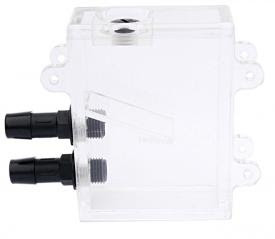Dear Readers,
For the past 3 years, i have had a personal hobby to create high end desktops with Liquid Cooling System (LCS). Most of the people think LCS is just for bling bling effect, which is only half truth. LCS plays a major role in keeping my computer running smooth and stable by cooling it efficiently.
I will try me best to simplify this article as best as i can.
What is Computer Cooling?
Computer Cooling is a way to keep your computer processor (the brain), cool. Because the processor is made up with millions of electric transistors which generate heat when operating. And faster processors mean more the transistors, hence extra heat generated. If the CPU is not kept at operable temperatures, then system failure is imminent and the lifetime of the CPU is drastically shortened. While there are many ways to cool the processor, the most common is Air-Cooling. For air-cooling, the processor comes in contact with a heat sink, which removes heat from the processor and transfer it to its aluminum block, and then on top of that bock is a fan, which removes heat from the heat sink. And the cycle continues, hence your CPU has less heat, and is operating at reasonable temperatures.
The main setback with air-cooling is that the fans are NOISY. And if your processor is running at maximum load, then the heat produced is high, and that results into fans running at its fastest speeds to remove the access heat. Another disadvantage of air-cooling is Dust. If the fans accumulate dust, it will not efficiently cool the processor.
So Why Liquid Cooling?
The thermal conductivity of liquid water is about 25x more than the air. Thermal conductivity is a property that describes how well it transfers heat. So obviously liquid has a huge advantage over air-cooling as it allows for much faster transfer of heat.
While air-cooling is acceptable with 99% of the computer users, there are some hardcore users who will need Liquid Cooling Systems. The reason they need to resort to such extreme cooling is because they are over-clocking the processor.
What is Over-clocking (OC)?
Over-Clocking is a method by which the processors are made to run at higher speeds than it was designed to. Meaning if you bought an Intel Core 2 Duo 2.2 Ghz, by over-clocking the processor, you can make it run at 3.0 Ghz. Its not as simple as it sounds though. By over-clocking you will void your warranty, blow up your components if not careful with the voltage setting etc. And not every user will be able over-clock the processor because of the time and patience it takes to tinker with the BIOS.
AGAIN, Why Liquid Cooling?
Now that you know what over-clocking is, it will be easier to explain this question. So there are computer enthusiasts that over-clock their processor, to get better performance and cheaper price.
Now here is the scenario, lets ASSUME you bought a Core 2 Duo 2.2 Ghz processor. The processor is rated to run @ 2.2 Ghz
Currently operating with Air-Cooling inside your computer, the processor's temperature is 50 degrees.
If you OVER-CLOCK it to 3.0Ghz, meaning you are asking it to perform faster, the processor's temperature will rise up to 90 degrees due to the increase calculations.
The fan doesn't have enough capacity to cool this processor down. So you will have to resort to liquid cooling system.
By adopting LCS, the temperature of the over-clocked 3.0Ghz processor will be around 45 degrees.
So if a Core 2 Duo 2.2 Ghz processor costs 200$
and a Core 2 Duo 3.0 Ghz processor costs 500$.
You manage to save 300 $ by over-clocking your 2.2 to 3.0.
How Does Liquid Cooling Work?
CPU Block - This is a copper based, hollow block, which contains liquid inside. Which is placed on top of your processor so heat can be transferred away from the CPU and to the water.
Radiator - This receives hot water from the Block, and cools it and sends out cooled water out from another outlet.
Reservoir (TANK) - This is where the cooled liquid is stored.
Pump - This does the process of taking cold water from the tank, and sending to the CPU Block, and then to the Radiator and then back to the Tank.
-----------------------------------------------------------------------------------------
------------------------------
THIS ARTICLE IS BY NO MEANS TRYING TO ENCOURAGE YOU TO OVER-CLOCK or USE LIQUID COOLING.
IT IS ONLY MEANT AS A SOURCE OF INFORMATION AS TO WHY I OVER-CLOCKED AND USED LCS IN MY CUSTOM BUILDS.
By over-clocking you will void your processor warranty, might damage your cpu/ram/graphics card in the process of tinkering with the settings. And you may blow up your motherboard if you try to install an LCS and fail to check for leakages.






why doesn't ur website custompctz.com work or is there a mistake in my typing
ReplyDeleteoh and send reply if u want 2 2 omnitrixpower@live.com
ReplyDeleteThe website custompctz has been shut down. Thanks
ReplyDelete